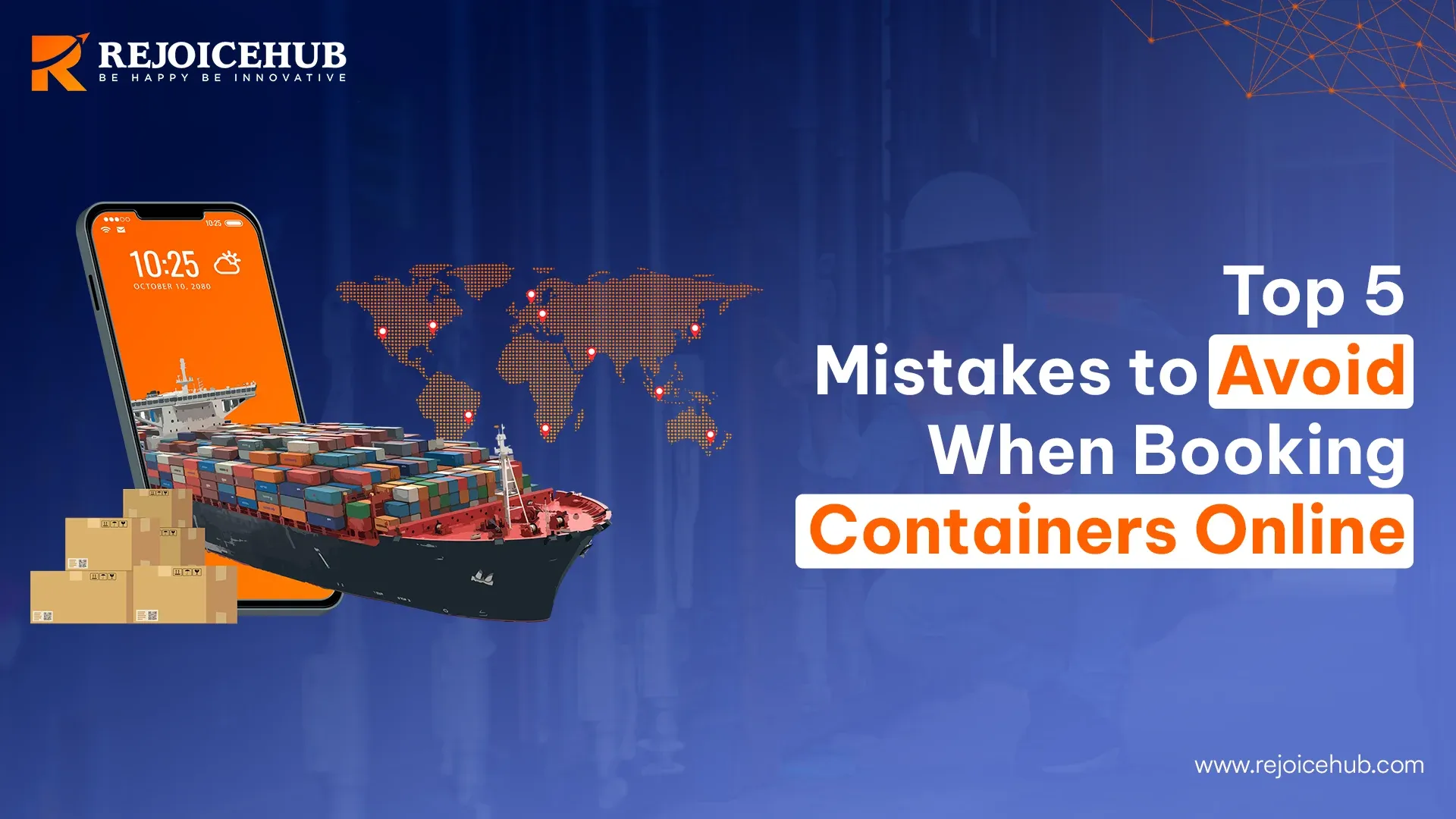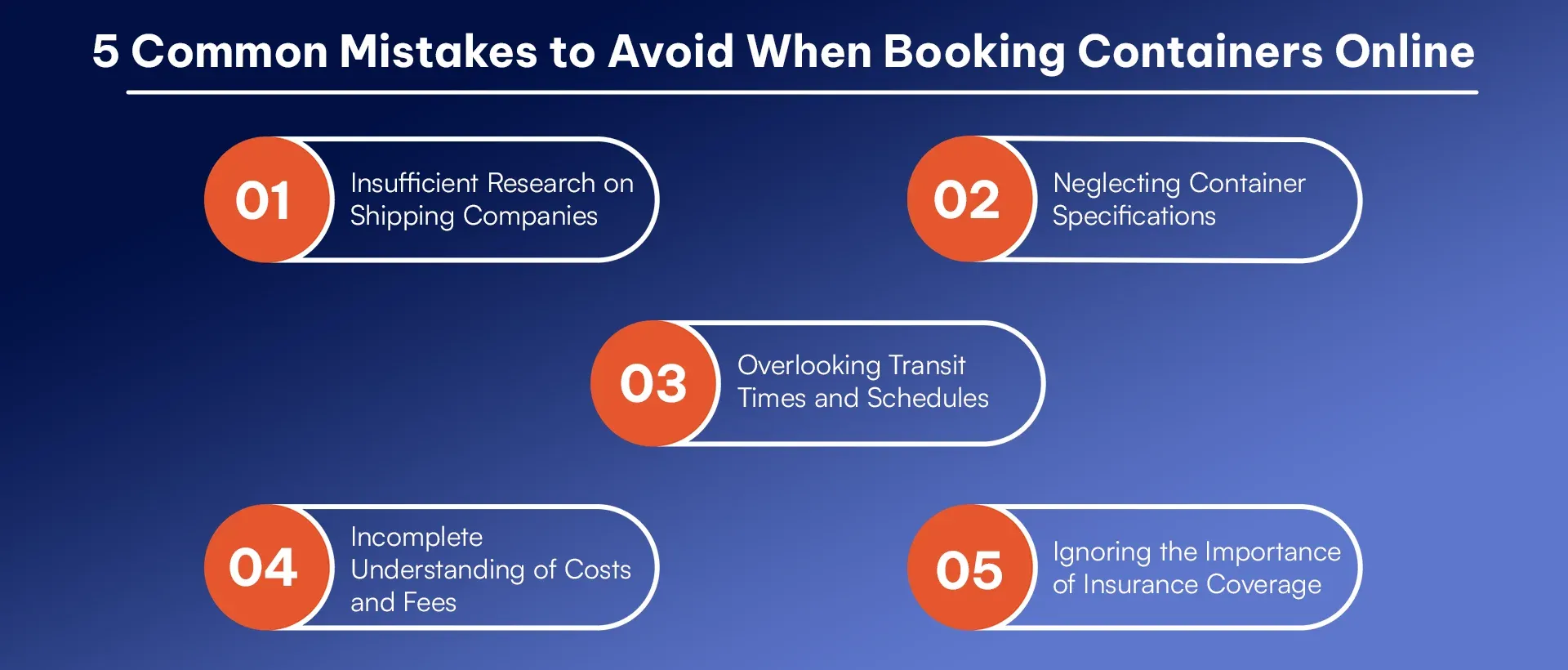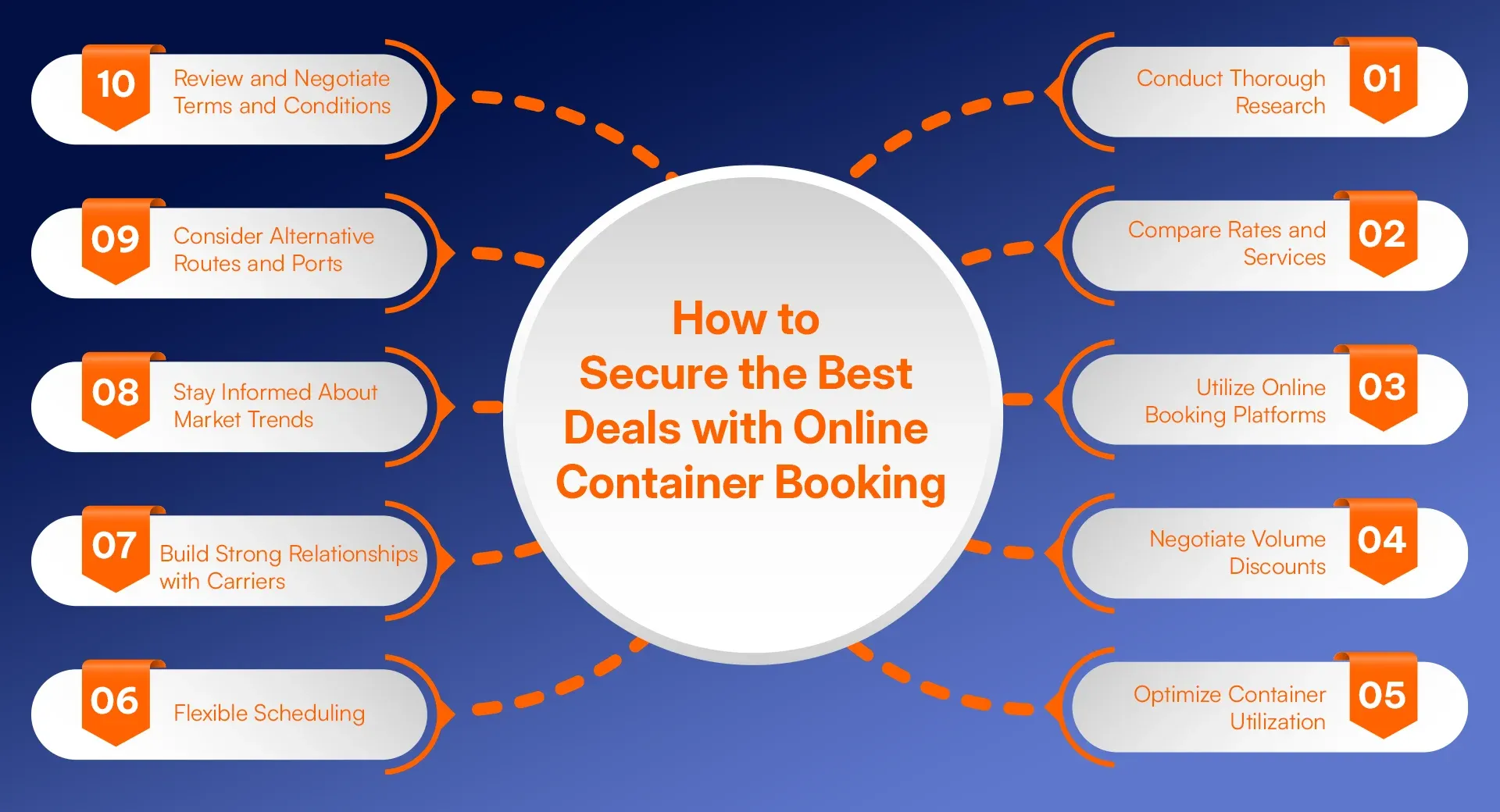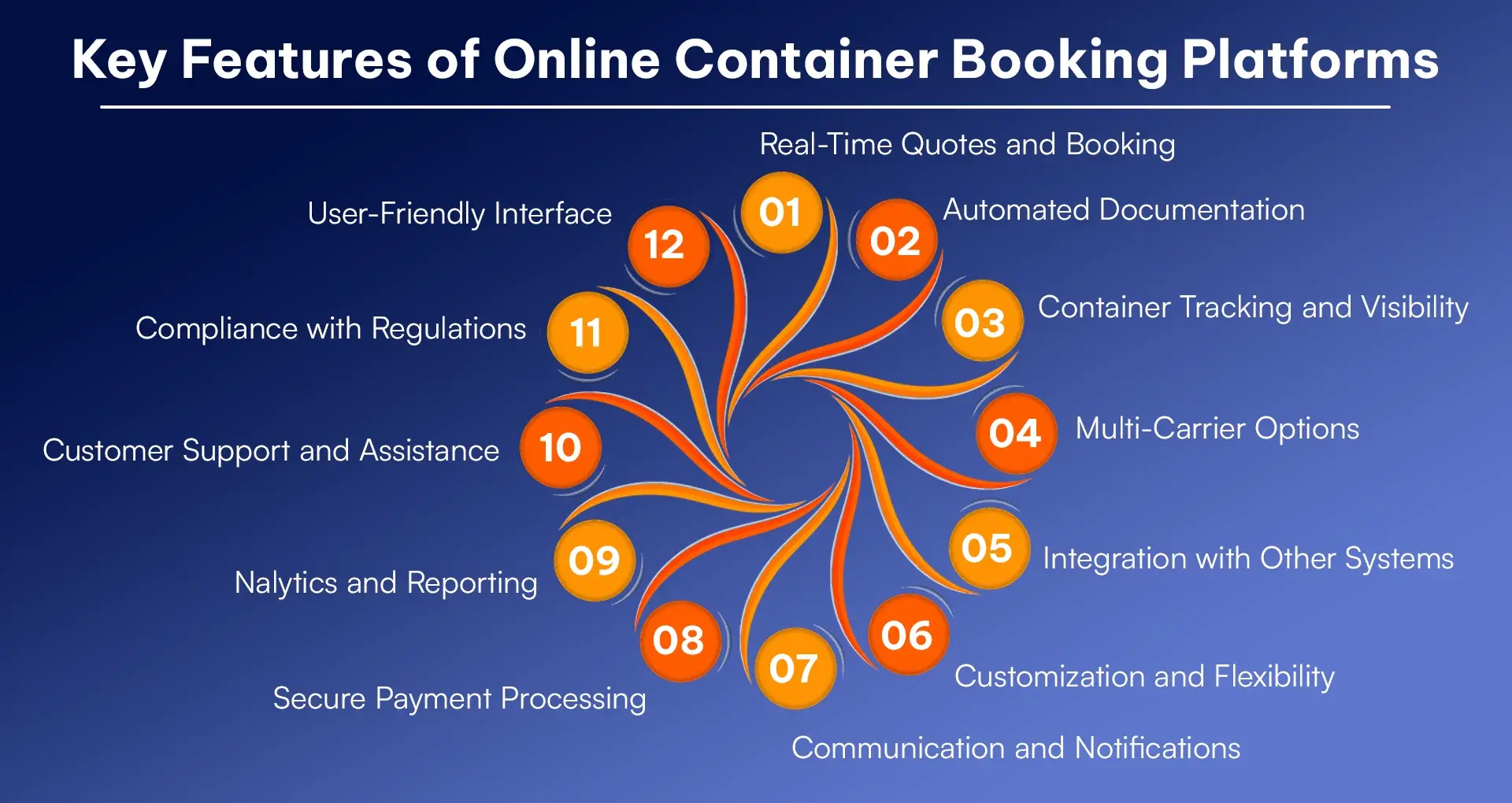Top 5 Mistakes to Avoid When Booking Containers Online

Piyush Barvaliya
Technical content writer
In today's fast-paced global trade environment, online container booking has become a convenient and efficient method for businesses to manage their logistics. With just a few clicks, companies can reserve containers, streamline shipping processes, and gain better control over supply chains. However, despite its advantages, booking containers online is not without its pitfalls. Making mistakes during this process can lead to costly delays, logistical challenges, and even financial losses.
Quik Summery
This article highlights the top five common mistakes businesses often make when booking containers online and provides practical tips to avoid them. From overlooking hidden fees to misjudging container sizes and failing to verify shipment details, understanding these pitfalls will help businesses optimize their shipping strategies, enhance operational efficiency, and ensure a smoother logistics experience. Whether you are a seasoned logistics professional or new to the world of freight management, avoiding these mistakes will save you time, money, and headaches.
5 Common Mistakes to Avoid When Booking Containers Online
Online booking of containers is a very important part of contemporary logistics and international trade. Despite the ease of digitization that has made the process efficient, there are certain risks that could stop your supply chain and cause some unexpected costs.

1. Insufficient Research on Shipping Companies
In this digital age, many shipping companies provide online container booking services. Yet, not all of them are on par in terms of trustworthiness, efficiency, and customer satisfaction. It is essential to spend time on research and choose a shipping company with an established reputation. Check customer reviews, testimonials and industry ratings for an understanding of the company's performance, reliability and punctuality. A comprehensive assessment will assist you in selecting a partner that is consistent with your particular shipping needs and guarantees the safety and punctuality of your goods.
2. Neglecting Container Specifications
Containers come in different shapes, sizes, and specifications, each of them being a design for specific cargo needs. Failure to meet the exact requirements of your goods may result in logistical problems, damage and additional costs. Take time to know the dimensions, weight limits, and features of different types of containers. Carefully match these with your cargo nature so that you are able to get the best protection and cost-effectiveness. Whether you need a standard dry container, a reefer or special container for outsize cargoes, making the right choice is the key to successful shipment.
3. Overlooking Transit Times and Schedules
The time factor is of prime importance in the international trade and you should be able to read between the lines of the transit times and schedules. Ignoring the estimated time it will take for your goods to get to its final destination can result in delays, thus affecting your production plans and customer orders. Keep in mind the shipping route, any possible stopovers as well as factors that may affect transit time such as weather conditions or customs clearance. Also checking on the holidays or peak shipping seasons in the destination country will let you plan more effectively and help you to avoid unnecessary disruptions.
4. Incomplete Understanding of Costs and Fees
Sometimes the convenience of internet transactions can make one overlook the intricacy of the costs that come with container shipping. For avoiding financial surprises, a thorough understanding of all charges is a must. Besides the basic transportation fees, think about customs duties, taxes, terminal handling charges and any other miscellaneous fees that may apply. Ask for a detailed break down of the costs from the shipping company and see to it that there is transparency in case there are any possible additional charges. This transparency will allow you to plan your budget well and avoid any financial surprises.
5. Ignoring the Importance of Insurance Coverage
Mishaps, thievery or any unexpected events on the way can seriously harm your cargo. Ignoring insurance coverage is a big mistake which might lead to large financial losses. Start discussions with your selected shipping company to get a better understanding of the available insurance options. Analyze the nature and value of your cargo and choose an insurance plan that gives sufficient protection against possible risks. Though it may look like an extra cost, insurance offers irreplaceable protection and mental peace throughout the entire shipping process.
How to Secure the Best Deals with Online Container Booking
The art of securing the best deals with online container booking is a combination of strategic planning, research, and effective communication.

1.Conduct Thorough Research
Start by doing your research and finding the trustworthy shipping companies that have a good record of reliability and positive customer feedback. Look for companies that are into your specific trade routes and have an excellent global network. Online platforms, industry forums, and reviews may be sources of information about the performance of different shipping providers.
2. Compare Rates and Services
Do not agree to the first offer you get. Ask for quotes from several shipping companies and compare their prices, services and terms. You should remember that the cheapest option is not always the most dependable so do compromise on price and quality of service. Choose providers who offer reasonable prices while still providing the necessary services like tracking, customer support, and container security.
3. Utilize Online Booking Platforms
Benefit from using online container booking platform which offer direct communication between shippers and carriers. The platforms often give real-time quotes, allow instant booking and ease the documentation process. By getting rid of middlemen, you may be able to have more control over the negotiations and cut costs linked to third-party services.
4. Negotiate Volume Discounts
If you have regular or bulk shipments, use your shipping volume as leverage to bargain for good terms and discounts with the shipping company of your choice. Long-term partnerships with shipping companies often are appreciated and such partners may be given better rates. It is important to express your shipping needs, frequency and volume clearly to find out whether there are possibilities of getting volume-based discounts or customised pricing agreements.
5. Optimize Container Utilization
Maximize the utilization of your shipments by optimizing the container space. Choose the right type of container for your goods, try consolidating smaller cargoes into one container, and think about using intermodal transportation for inland transport. Effective containerization leads to cost reduction and environmental impact minimization.
6. Flexible Scheduling
Be flexible with your time and be willing to work irregular hours if the job demands. It is often possible to obtain lower rates by shipping during off-peak seasons or by selecting less congested routes. There may also be cost savings through the use of flexible pickup and delivery dates as carriers can optimize their schedules and transfer the benefits to you.
7. Build Strong Relationships with Carriers
By creating trustful relations with shipping companies, you can achieve more advantageous offers and benefits. Regular communication, prompt payment and the commitment to long-term partnerships will bring about a win-win relationship. Share your shipping needs openly and work together to come up with solutions that satisfy both sides objectives.
8. Stay Informed About Market Trends
Keep yourself updated on the market trends, the changes in fuel prices and the shifts in international trade regulations. Market intelligence will enable you to take informed decisions and adjust your shipping strategy. Stay tuned with industry news, attend trade conferences, and build professional networks to keep ahead of the game.
9. Consider Alternative Routes and Ports
Explore alternative shipping routes and ports to find more cost-effective options. Depending on the nature of your cargo and destination, choosing less congested ports or alternative transportation modes (e.g., rail or barge) may result in lower overall costs.
10. Review and Negotiate Terms and Conditions
The terms and conditions of the shipping contract should be reviewed carefully. All clauses that can affect your costs or flexibility should be negotiated. Give consideration to such factors as demurrage and detention charges, cancellation policies, and liability limits. Clarifying all the details at the beginning of a project can help to avoid disagreements and unanticipated costs in the future.
Understanding the Key Features of Online Container Booking Platforms
Digital platforms that offer online container booking are instrumental in optimizing the logistics and shipping operations, they present an array of tools that improve efficiency and convenience of businesses taking part in international trade. Key features of these platforms should be well known to facilitate informed decision making and hence maximizing the experience in booking containers.

1. Real-Time Quotes and Booking
You can access the real-time quotes generation function through online container booking platforms. Users can input information like the type of cargo, weight, dimensions, and destination to get instant quotes. If users are content with the quotes they may continue with the booking process directly on the platform.
2. Automated Documentation
Automation of documentation is a principal component in the digitization of the system that reduces paperwork and increases efficiency. Online platforms often automate the creation of important shipping documents like bills of lading, invoices, and packing lists. It is not only time-saving but also reduces risk on documentation work.
3. Container Tracking and Visibility
The container tracking is the crucial feature that gives the live view on where and how the goods are moved. Users can track containers at every stage of the entire shipping process which leads to improved planning, monitoring and proactive management of possible issues.
4. Multi-Carrier Options
A number of online container booking platforms work with multiple shipping carriers, allowing users to select from a wide range of service providers. This helps in that shippers can select the carrier that will best fit their particular needs in terms of cost, transit time, and reliability.
5. Integration with Other Systems
Integration functionalities are necessary for the smooth data exchange between the online container booking platform and other systems that are used by the shipper. The platform also interfaces with the ERP, WMS, and other relevant tools which in turn increases overall operational efficiency.
6. Customization and Flexibility
Features like automated notifications and alerts facilitate effective communication. Shippers are provided with regular updates on the status of their cargoes, possible delays, and other pertinent information. The messages which are clear and timely will enhance decision-making and proactive issue resolution.
7. Communication and Notifications:**
Features like automated notifications and alerts facilitate effective communication. Shippers are provided with regular updates on the status of their cargoes, possible delays, and other pertinent information. The messages which are clear and timely will enhance decision-making and proactive issue resolution.
8. Secure Payment Processing
Online container booking platforms usually have the secure payment processing features. Shippers can make payments for their bookings through the platform using different payment methods, which ensures the financial transaction process is secure and transparent.
9. Nalytics and Reporting
Advanced analytics and reporting functionalities allow users to analyze their shipping data. Shippers can learn about key performance indicators and track historical shipping trends in addition to making data-driven decisions to optimize their supply chain operations.
10. Customer Support and Assistance
Responsive customer support is a key feature, guaranteeing that users can get help when they need it. Many platforms offer live chat, email support, or customer service hotlines to solve questions, give direction and settle matters quickly.
11. Compliance with Regulations
Compliance with the international shipping regulations is a fundamental part of online container booking platforms. This encompasses customs requirements, trade sanctions and other legal considerations for the purpose of ensuring that shipments are in compliance with all relevant laws and regulations.
12. User-Friendly Interface
An interface which is user-friendly is necessary for an experience which is smooth for users. Intuitive navigation, clear instructions and easily accessible features contribute to the efficiency and effectiveness of the platform.
Conclusion
Online container booking is a key instrument in the international logistics process but its effectiveness depends on a good planning and informed decision-making. By not making these common mistakes you can upgrade your skill of dealing with container shipping complexity, thus improve the supply chain of your business.

Written by Piyush Barvaliya(Technical content writer )
Rejoicehub LLP, a top-rated IT service provider, places great value on helping other IT professionals across the board. We are consistently delivering comprehensive and high-quality content and products that provide customers with a strategic advantage to improve, expand, and take their business to new heights by using technology. You might as well find us on LinkedIn, Instagram, Facebook or Twitter.
Related Blogs
Machine Learning in Insurance: Use Cases & Future Trends
Vikas Choudhary
AIML & Python Expert
Jul 5, 202517 minHow to Use AI in E-commerce Business in 2025
Harsh Mishtry
AI/ML & Python Expert
Jul 4, 202514 minHow to Integrate GPT-4 in Just 5 Easy Steps
Keshav Sharma
AI/ML & Python Expert
Jun 30, 202520 m inCustom AI Software vs. Off-the-Shelf: Making the Right Choice for Your Company
Vikas Choudhary
AIML & Python Expert
Jun 28, 202516 minHow Can Generative AI Be Used In Cybersecurity ?
Keshav Sharma
AI/ML & Python Expert
Jun 28, 202520 minWhat Is AI in Media and Entertainment? Explained with Examples
Vikas Choudhary
AIML & Python Expert
Jun 26, 202517 min11 Best AI Agents for Automating Business Workflows in 2025
Harsh Mishtry
AI/ML & Python Expert
Jun 20, 202518 minWhy Your Business Needs a Mobile App in 2025: The Ultimate Guide
Vikas Choudhary
AIML & Python Expert
Jun 19, 202515 minTop 10 AI Agent Companies in 2025: A Complete Guide
Keshav Sharma
AI/ML & Python Expert
Jun 18, 202515 minTransform Your Customer Support with AI Automation
Vikas Choudhary
AIML & Python Expert
Jun 17, 202517 minWeekly Newsletter
Get blog articles and offers via email
FAQs
Frequently Asked Questions
Here's a list of FAQs that will help you to know more about our services.
What services does Rejoicehub LLP provide?
How can Rejoicehub LLP help my business with AI/ML?
What is the typical process for a web or mobile development project with Rejoicehub LLP?
How does Rejoicehub LLP ensure the quality of UI/UX design?
What makes Rejoicehub LLP DevOps services different from others?